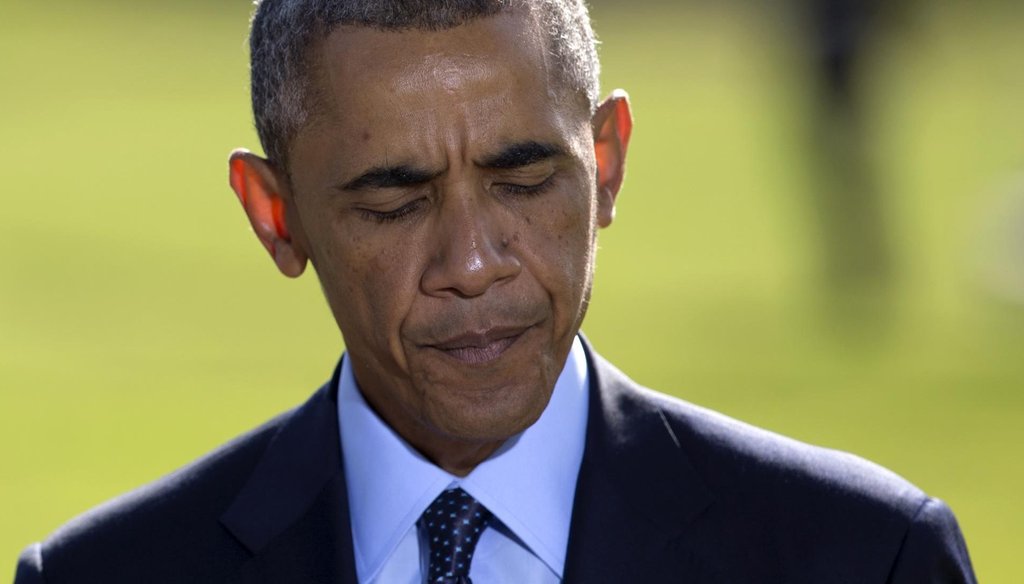Stand up for the facts!
Our only agenda is to publish the truth so you can be an informed participant in democracy.
We need your help.
I would like to contribute

President Barack Obama pauses as he speaks about the participation of five Arab nations in airstrikes against militants in Syria on Sept. 23, 2014, on the South Lawn the White House. (AP/Carolyn Kaster)
The debate about the air strikes in Syria continued Sunday as pundits compared President Barack Obama to President George W. Bush and wondered why Congress is currently in recess.
On CNN’s State of the Union, political commentator LZ Granderson said Obama is losing favor among his base because of his recent foreign policy decisions. In 2008, Obama supporters were tired of the wars started under Bush and were hoping that a new president would bring them to a close.
"They voted for him because he was supposed to end these wars and stop bombing people," Granderson said. "And when you look at the raw numbers, three times as much Special Forces were used than ‘W.’, twice as many strikes (on) countries that are predominantly Muslim. Those were not the numbers that his staunch progressive base voted for."
Granderson’s comparison about the number of air strikes on predominantly Muslim countries rates Mostly True.
Granderson said Bush conducted air strikes against Afghanistan, Iraq, Pakistan and Somalia. Obama continued strikes in those four countries and targeted three additional, Granderson said: Yemen, Libya and Syria.
Sign up for PolitiFact texts
None of those attacks are really in dispute. You could however, potentially make the case that Bush bombed Yemen as well. According to BBC News and Time, Bush authorized one drone strike in Yemen in 2002.
There’s also unconfirmed reports of drone attacks on suspected militant camps in the Philippines in 2006 and 2012, under both presidents.
But for all intents and purposes, Granderson’s list is about right.
And, as Granderson said, all of those countries are overwhelmingly Muslim. According to the Pew Research Center, all seven countries are more than 90 percent Muslim.
The only caveat is that Obama’s list is nearly twice as large as Bush’s -- 1.75 times to be exact. Granderson left out that qualifier in his on-air remarks.
Elsewhere, we heard pundits debating the role of Congress in authorizing Obama’s use of force in the Middle East. Obama contends he has authority to conduct air strikes under a 2002 congressional resolution, but others say he needs new approval from Congress.
But Congress is on recess ahead of the midterm elections.
"The Congress adjourned earliest of any time in congressional history before an election," conservative radio host Laura Ingraham claimed on ABC’s This Week. "They didn't take a vote on this because, just like with immigration reform, we have a lot of profiles in the opposite of courage on Capitol Hill. They don't want to be held accountable. Article 1, Section 8 (of the Constitution) vests the power solely in Congress … to declare war.
"Congress should vote," Ingraham said a few seconds later. "We should have civilian authorization, civilian leadership authorization for this war, otherwise we're going to be in for real trouble down the road."
Ingraham’s claim that Congress "adjourned earliest of any time in congressional history before an election" rates False.
Technically Congress hasn’t adjourned -- meaning its business is done for the year. It’s in recess.
Setting that aside, Ingraham remains wrong.
The House of Representatives keeps a table with the schedule of every session of Congress going back to 1789. To check Ingraham’s claim, we need only go back as far as 1960. That year, Congress ended its session for the year and adjourned on Sept. 1. That was a full adjournment (not just a recess), and it came 18 days sooner than this year’s extended recess.
For the record, 1960 was the year that Republican Richard Nixon faced Democrat John F. Kennedy.
Interestingly, Sept. 1 was not particularly early for that period. In 1959, Congress adjourned for the year on Sept. 15. In 1958, Congress adjourned Aug. 24. In 1956, it was July 27. (1956 and 1958 were election years).
Jon Greenberg and Nai Issa contributed to this report. Read the full fact-checks at PunditFact.com.
Our Sources
See individual fact-checks.










































